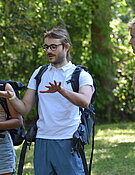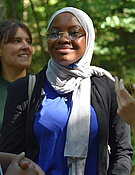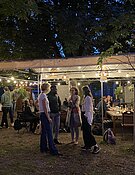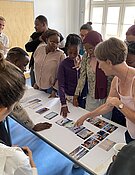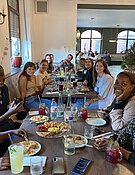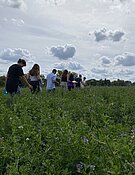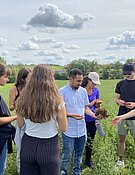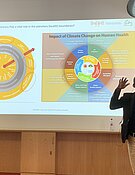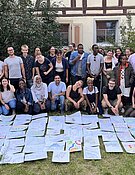2023
SOPHEA SUMMER SCHOOL PLANETARY HEALTH 2023
Our well-being is heavily dependent on healthy and resilient ecosystems, however, the impact of human disruptions on earth and climate change is severely affecting all living species. Planetary Health is studying these interactions, asking for collaboration across disciplines to address climate change and to develop and apply strategies to safeguard our health.
The annual Planetary Health Summer School in Würzburg is a solution-oriented, transdisciplinary event that brings together people interested in Planetary Health, eager to learn about the connection of human health and the climate crisis and willing to contribute to societal change. The ten day Summer School has been part of the SOPHEA project (Strengthening One and Planetary Health) as a joint project of the Catholic University of Health and Allied Sciences (CUHAS) in Tanzania, the University of Eldoret in Kenya, and the University of Würzburg, Germany. It took place at the University Hospital Würzburg and was mainly organised by the SOPHEA team at the Department of General Practice but held in collaboration with other institutes of the University.
The Summer School does not only aim at educating participants on planetary health concepts and the interconnections between human health, the environment and ecosystems but focuses on teaching how to acquire practical skills to address planetary health challenges.
Therefore, developing an own project idea tackling a self chosen planetary health issue is a core element of the course. Its intention is to empower participants, and to increase their confidence in taking transformative action.
One of the participants expressed her feelings upfront as follows: “What annoys me most about my current situation is that I feel kind of stunned and helpless since I have no idea how to productively do something about climate change and for Planetary Health. Maybe it´s a bit too ambitious, but I would really like to leave with concrete ideas how I personally can have a real impact.”
This year's 34 participants came from Germany, Tanzania, Kenia, Italy, Rwanda, Sudan, Nigeria, Lebanon, and Afghanistan, with wide-ranging professional backgrounds, spanning from medical professions to environmental scientists, bioethics, law, and sustainable financing.
So did the lecturers of the Summer School: ranging from the Department of Geography, Applied Biodiversity Science, to Literature Studies. In addition, internationally working healthcare professionals, including nurses, midwives, epidemiologists, public health specialists and physicians taught on their subjects. The topics reflected the complexity of the ecosystem and highlighted the interlinkage of the disciplines, covering the following aspects:
- Introduction to Planetary Health and concepts
- agriculture and nutrition
- conflicts, human rights, migration and climate crises
- climate change, land use, biodiversity and ecosystems
- health workforce: midwives and climate change
- international policy and climate change
- climate crisis communication
- linking planetary health and social sciences through poetry
This, however, was everything but theoretical. Participants started the Summer School by playing a climate simulation game, learned about heat and urban spaces during a city tour and went to an agroforestry farm to witness organic farming and adaptation strategies for climate change.
Moreover, participants practiced mindfulness exercises when doing forest bathing and exchanged ideas about their projects during walks and dinners.
The development of a project, was well received by participants: “I didn't expect to enjoy the group work as much as I did. I really benefited from our group-intern discussions. Developing our projects and seeing it each grow with the topic were my highlights.” Another participant stated: “The project work was one of the best assignments I have had to do in years. I felt empowered to improve the health of the planet as I was thinking about it and developing it.“
As the Summer School came to an end, the enthusiasm and motivation to continue the work was palpable, not least because a new network of Planetary Health advocates, possible change makers and friends has been established: amongst participants, alumni, and lecturers. As someone said, the Summer School has helped „underlining that it takes all of us, wherever we are, whatever our background and however experienced - and seeing that there is a big network waiting for us to join and share our resources.“


